There’s no question that the future of commerce is shifting to online. With our phones readily available every minute of the day, the ease of browsing, shopping, comparing, shipping, and even returning, are making online shopping just about everyone’s first choice today.
So, the question for any forward-thinking business owner becomes, how do I get online? That’s the easy part. There are thousands of Ecommerce website builders that you can find with a simple Google search. The hard part comes with choosing the right one for your business. A website builder has to be easy to use, offer the right combination of features, and all fit within your budget. A little daunted? Don’t be; here are 10 of the best Ecommerce site builders on the market for businesses with their eye on expansion in 2024.
1


- Best for – SMBs, startups seeking advanced features
- Price – From $29
- Free trial – Yes, 3 months for $1/month on select plans
RATING
Exceptional 9.9
Shopify might well be the most popular Ecommerce platform around today. It’s easy to work with, has more features built-in than you’ll know what to do with, and even supports multichannel selling and social media integration. Shopify has great features like inventory management and abandoned cart recovery. You can also use more than 100 payment gateways for worry-free transactions.
The one downside to this versatile Ecommerce site builder is the transaction fee that gets charged for each transaction. You can skip this payment by using Shopify Payments, but if you are dedicated to your processor, expect to get charged. Shopify provides 24/7 support, 12,000 third-party apps to install, and more than 50 beautifully designed themes with an easy editor to give your website a customized look and feel.
PROS
- Industry-reputation for excellent features suite
- Extremely simple to use
- 100+ payment gateways
CONS
- Have to reformat content when switching templates
- Applies a transaction fee unless using Shopify Payments
2

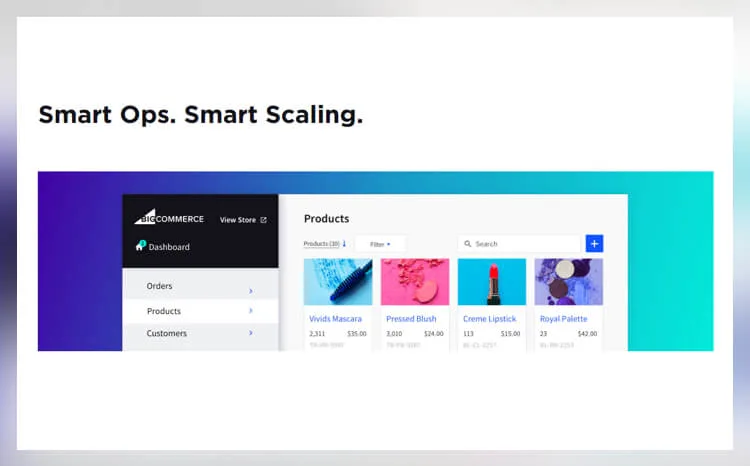
- Best for – Businesses seeking scalability
- Price – From $29.95
- Free trial – 15 days
RATING
Exceptional 9.8
BigCommerce is one of the biggest and most reputable Ecommerce builders on the market today. This is because of the wide range of features, sales tools, and integrations available through its service. The easy-to-use system lets you quickly and efficiently set up an online store, sell products, and accept payments. BigCommerce also goes the extra mile, though, with tools that actually help improve your business. Things like analytics, SEO tools, and next-level shipping allow online stores to move products faster.
While not all templates are responsive, most will work well on mobile devices. And with features like abandoned cart recovery, SSL security certificate, and the ability to sell on multiple channels like Amazon, Instagram, Facebook, and more, it’s worth testing out a few templates to reap the benefits of working with BigCommerce.
PROS
- Scales easily with your business growth
- Multichannel selling made easy
- Huge assortment of tools and features
CONS
- Not all designs are responsive
- Tough learning curve at the beginning
3

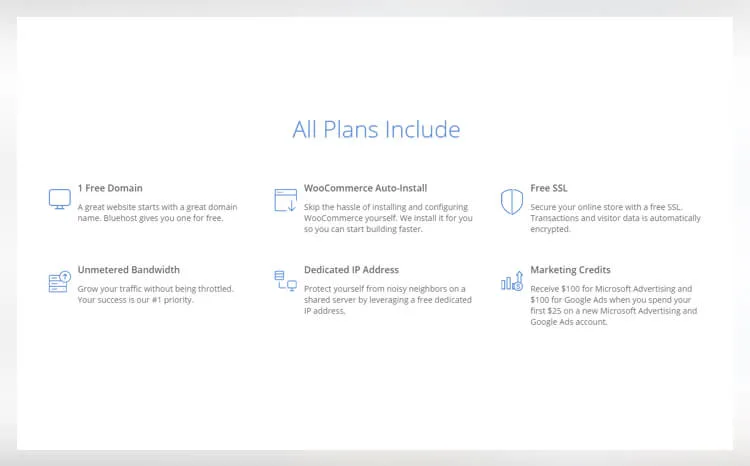
- Best for – WordPress businesses
- Price – From $19.99
- Free trial – 30 days, 90-day money-back guarantee
RATING
Exceptional 9.7
When you sign up for Bluehost powered by WooCommerce, you really get the strength of 3 huge brands supporting your online store. WooCommerce is an open-source online shop builder specifically designed for WordPress sites, and it’s known for being simple to use while packing a powerful punch at the same time. BlueHost is an all-inclusive hosting service that gives you an SSL certificate, free domain name, and 1-click WordPress installation with every plan.
So, you know you’re getting a powerful and reliable service with this dynamic duo. In terms of website design itself, WooCommerce is a great choice. It takes minutes to choose and design your site from one of the templates. Then you can configure your online store with the many extensions provided. Add your products, create coupon codes, and set up tax and payment rules to fit your shopping cart. The combo team isn’t as good for scaling up or down with your business, but if you’re looking for easy migration, intuitive setup, and lots of features, it’s just a more efficient, self-explanatory, and easy-to-use system than you’ve probably dealt with in the past.
PROS
- Get all your hosting requirements included
- 1-click WordPress setup
- Unlimited bandwidth and storage
CONS
- Not as scalable as other options
- Very WordPress-focused
4

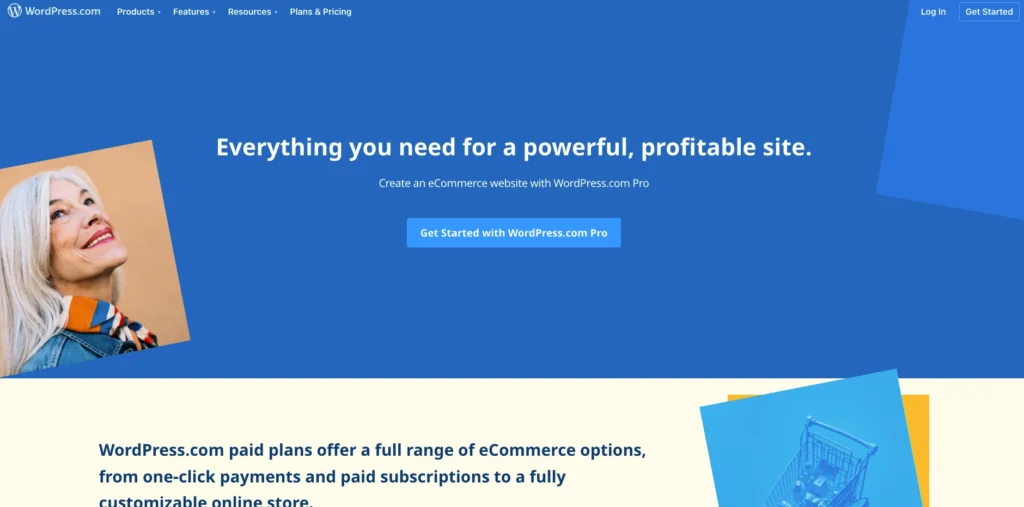
- Best for – Plenty of features at a reasonable price
- Price – Starting at $4.00 per month
- Free trial – Yes
RATING
Excellent 9.6
Wordpress is one of the biggest and best content managment systems that goess well beyond simply managing content.
If you’re buildding an eCommerce site, Wordpress makes it easy – whether you want to build a site from scratch or use one of the compaines many pre-existing templates. Sites are mobile-frienbdly, easy to update and you can choose from muptiple plans.
PROS
- Customizable domain names
- Plenty of plans to choose from
- Exceptional customer support
CONS
- May experience bugs when migrating to other systems
- Some techincal knowledge is required
5

- Best for – Professional site design, top quality & tools
- Price – From $12
- Free trial – Yes
RATING
Excellent 9.3
Squarespace is a smaller name, which is funny because, in our book, it’s probably the best option for really professional Ecommerce building. The quality of design templates and built-in features make Squarespace stand out from the competition. And you can customize designs to your liking. There are also plenty of important features from this online store builder like inventory management and unlimited products, and video uploads included in your plan. While some Ecommerce services are cheaper, Squarespace provides a sleek, professional online store. You know exactly what you paid for.
Squarespace is also a leader in marketing and promotion. Online stores can grow their business with social media integration tools, built-in SEO tools, and email marketing campaigns that you can set and forget. Design banners and create promotions to highlight and sell specific items, and check analytics even while you’re on the go with the Squarespace mobile app.
PROS
- Strong marketing tools, email campaigns, SEO, and more
- Most professional designs on the market
- Inventory management and abandoned cart recovery included
CONS
- Shallow sub-navigation
6

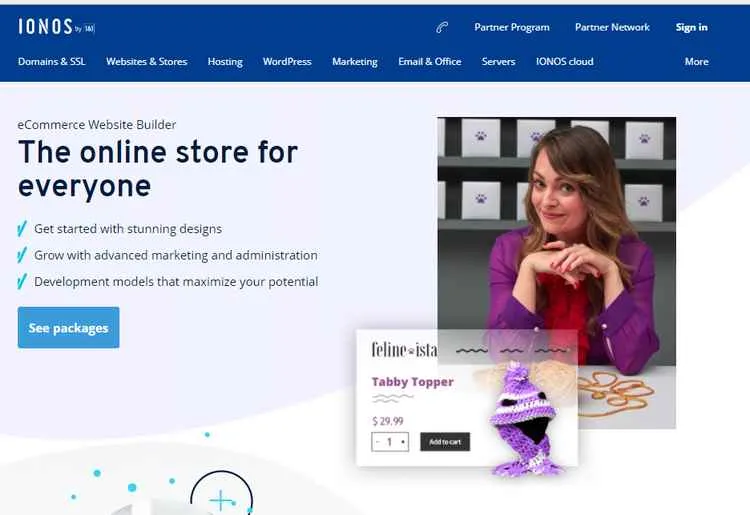
- Best for – Users that want a quick Ecommerce site
- Price – From $25 / month (Online Store tier)
- Free trial – No
RATING
Excellent 9.2
If you’re looking for an Ecommerce website builder that combines the ease of drag and drop with the power to scale up to 1 million products, then IONOS’s tool might be what you’re looking for.
There’s also online payment gateway support, included hosting, an SSL certification, and the ability to configure multilingual stores. One of its 3 tiers might be perfect for your online business.
PROS
- Multilingual support
- Up to 1 million items
- SSL for security
CONS
- No wish lists on bottom tier
- B2B only on top tier
7

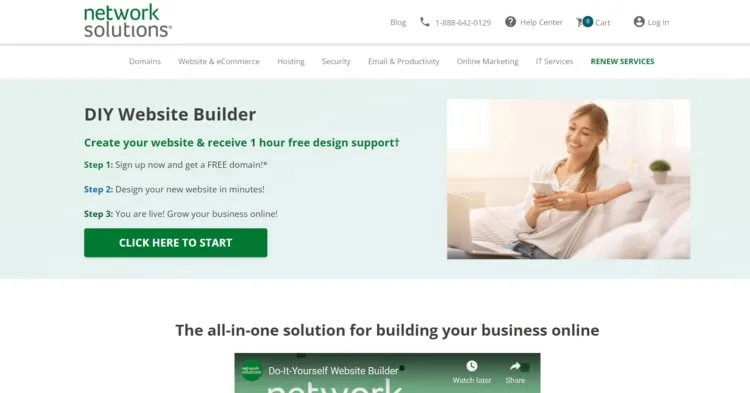
- Best for – New businesses looking to expand online
- Price – Starting at $9.99 per month
- Free trial – Yes
RATING
Very Good 9.0
If you’re looking to take your business online, Network Solutions is a solid option, thanks to plenty of easy to use templates and tools. Network Solutions also features social media and Google Analytics integrations, a fully customizable store-front, a logo generator and mobile-freindly templates.
PROS
- Plenty of SEO tools
- Compatible with QuickBooks
- Extensive customization options
CONS
- No live chat support
- Limited inventory support
8

- Best for – Small online businesses, easy DIY website designing
- Price – Free- $229/month
- Free trial – Free plan
RATING
Good 8.8
Shift4Shop is a great option if you’re looking for an easy way to create a website for your online store. The ecommerce website builder allows you to choose from over 100 attractive templates that are free and mobile responsive. You can sort by industry to find the one that fits your business best. Best of all, Shift4Shop has a totally free end-to-end commerce plan that has more features than many paid-for builders offer.
Shift4Shop plans come with the latest technologies and features you’ll need to grow, manage, and promote your business. You have easy HTML and CSS editors, drag-and-drop editor, and blog integration. Shopping cart is conversion-optimized with reminders and discounts built in. Top it off with a colossal product order management system, unlimited products, and SEO tools, and Shift4Shop covers plenty of bases in one package deal.
PROS
- Free plan loaded with features
- Easy-to-use site builder with nice templates
- 24/7 assistance
CONS
- Designs aren’t ideal for all types of online stores
- Paid-for plans have a sales limit
9


- Best for – Total site-building newbies
- Price – Premium costs $12.80/month
- Free trial – No
RATING
Good 8.5
Site123 markets itself as a tool for website building newbies, but in reality there’s quite a bit of firepower under the hood.
This builder from Israel can do everything from gate digital downloads to keep automatic tabs on inventory levels.
PROS
- Automatic inventory tracking
- Sell digital downloads
- Wide integration library
CONS
- Can’t customize HTML/CSS
- Only 3 payment gateways
Compare Top10 Ecommerce Website Builders
Compare Top10 Ecommerce Website Builders
 |  |  |  |  |  |  |  |  | |
|---|---|---|---|---|---|---|---|---|---|
| Best for | SMBs, startups seeking advanced features | Businesses seeking scalability | WordPress businesses | Professional site design, top quality & tools | Users that want a quick Ecommerce site | Plenty of features at a reasonable price | New businesses looking to expand online | Small online businesses, easy DIY website designing | Total site-building newbies |
| Price | From $29per month | From $29.95per month | From $19.99per month | From $12per month | From $25 / month (Online Store tier) | Starting at $4.00 per month | Starting at $9.99 per month | Free- $229/month | Premium costs $12.80/month |
| Free trial | Yes, 3 months for $1/month on select plans | 15 days | 30 days, 90-day money-back guarantee | Yes | No | Yes | Yes | Yes | No |
| Templates | 70+ | 100+ | 1000s | 100+ | 50+ | 1300+ | 50+ | 110 | 28 |
| Payment Gateways | 100 external payment gateways | 40+ of your choice | PayPal, Stripe, PayFast, Amazon, etc. | Stripe, credit cards, Apple Pay, PayPal | Yes | PayPal, Stripe, 2CheckOut, Authorize.net, Braintree, Square | Yes | Yes | 3 |
| Integrations | Multichannel with Facebook, Instagram, eBay | Multichannel, Amazon, eBay, Pinterest | Fully compatible for multichannel selling | Fully integrated for multichannel | Hubspot, Yoast SEO, Elementor, and many more | Multichannel | Hubspot, Facebook Shop, eBay, Mailchimp, UPS, GSPay, Houzz, Aweber, Affirm, Printful, Avalara, Doba, Visa Checkout, many more | Google analytics, SEO tools, and more |
How to Choose the Right Ecommerce Store Builder
You have flexibility in how to fit your website into your budget once you have a plan that makes sense for your business. Most providers offer a range of choices, and you can adjust your plan as your needs change or your online efforts become more successful.
Fees for Ecommerce platforms can start from less than $10 per month, and some services offer a free trial period, allowing you to test whether or not a website makes sense for you. Your website can be a true extension of your business, and you can find affordable solutions that cost less than an additional hire.
Without having a website, you risk missing opportunities for additional sales and growth. Those missed opportunities cost you much more than the time and money you might spend on maintaining your online business. You may have taken a big risk when you started your business, and if you believe in what your business has to offer, you should have no trouble taking a small risk by putting it online.
So how do you know which is the right Ecommerce site builder for you? Comparing features that are important to you will help reveal the best solution for your specific situation. Here are a few non-negotiable features that every business should look for while on their search:
Templates
First impressions are important. So you want your online store to make a good one. That’s only going to happen with a fresh, crisp, clean, and responsive website design. Look for a website builder with attractive and industry-relevant templates to use. And unless you want your site looking like every other online store, you need a unique look. That either means having a lot of templates to choose from or having an excellent editor tool that will allow you to customize the design to perfection.
Mobile-responsive
More and more consumers are shifting toward mobile purchases and research. That means your online store needs to be mobile-responsive. A poor mobile experience will spell disaster for a website, so don’t make that mistake.
Payment gateways/solutions
Processing payments is another area your store needs to have down pat. Because if a customer runs into a hiccup while trying to checkout, most likely, they’ll just leave your store altogether and shop somewhere else. Look for an online store builder that has multiple payment processing options, offers free or affordable transaction fees, and makes it easy for your customers to check out.
Third-party integrations
No website builder has it all, but the smart ones allow you to integrate with external apps, so they don’t have to. Accessing other applications within your website expands your functionality, providing more power and flexibility in every area of your business.
Multichannel selling
This is debatable, but we think it’s important. The ability to sell across channels automatically increases your sales potential exponentially without having to do any additional work. Some Ecommerce platforms are confident enough that their site will bring in enough revenue for you (think Amazon) without the complications of multichannel selling, but most sellers prefer to have the choice.
Additional features that will make for a more attractive package include things like inventory management, customer management system, and SEO capabilities.
In terms of functionality, decide what your business’ needs are, how much product-selling you intend to do (and can handle), and what your budget is to determine which Ecommerce platform is right for you. For example, Volusion is a good option if you’re looking for cheaper processing rates, but WooCommerce is hands down the best choice if you are working with WordPress. Square is great for really small businesses, while Shopify is just a great all-around product. Figure out your needs and choose accordingly.
Shopping cart features
There are hundreds of Ecommerce applications on the market today. All of these applications will have most of the same basic features, such as the ability to list an item with photo and description, the ability for a consumer to purchase the item and provide payment. Beyond the basics, applications vary widely in their ease-of-use and features offered. Make a list of the features you want before starting your search.
Building an online store is more than just providing a product or service to customers online. Ecommerce websites need top of the line security systems, as cybercrimes like identity theft and stolen personal data have become the most reported consumer crimes in the US in the last decade.
Using an Ecommerce builder with a good reputation is a great start. All Ecommerce vendors are required to keep to guidelines set out by the PCI Security Standards Council. Never use an Ecommerce builder who is not PCI compliant.
Maintaining your own high-level security systems is integral to keeping your customers safe, and at the end of the day, any breach is going to result in an investigation into your practices.









